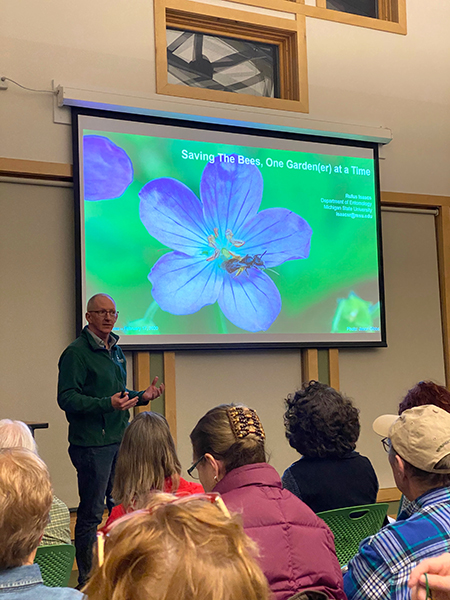PROGRAM RECAP • FEBRUARY 17, 2020
Compiled by Diane Phelps

Saving the Bees One Garden(er) at a time
Presented by Dr. Rufus Isaacs, Professor of Entomology and Extension Specialist, MSU
Dr. Isaacs’ work is mainly in fruit crops from Barry County to Traverse City in Michigan. He studies the economic impact on fruit crops as the result of declining honey bee population and the effect of native wild bees here.
Almost all plants are pollinated by bees as opposed to wind or other factors. Plants that are visited by bees produce larger, more abundant fruit than those that aren’t. Bees are of great importance to fruit farmers. In temperate regions especially, 78% of pollination is reliant on insects and other animals.
- Fruit farming in Michigan
- Almonds in California
- Forage plants for feed to livestock
- Coffee

Their value to blueberry farms has been studied and found 80% of pollination depends on bees and other pollinators. Blueberries crops bring in approximately $120 million.
Honeybees were brought over to North America by the early settlers to provide them with honey to sweeten their food and for bee’s wax.
Find out more from Michigan Beekeepers Association.
 Honeybees are:
Honeybees are:
- the bees that are most known by the public
- a managed population, non-native to the U.S.
- managed by 100 families in Michigan as “professional beekeepers”
- used by beekeepers to contract with farmers, who use the managed hives to pollinate their crops
The Bee-Poc-Alypse, as written about in non-scientific journals has made the general population aware of the plight of bees.
Bee populations have suffered severe losses in recent years due to:
- Parasites – mites in the honeybee has been measured at taking out 50% of a given population
- Poor nutrition – the decreased diversity of plants, i.e. more monoculture lawns
- Pathogens
- Pesticides – (the only “safe” one has BT) are often sprayed too close to the native plants that feed the bees.

Wild bees vs. honey bees—is like comparing—a chicken vs. a wild bird. Honeybees and chickens are both commercially managed.
Wild Bees:
- usually are ground-nesting
- normally are solitary
- some live in cavities
- a few live in hives
In Michigan we have:
- 465 species, (4,000 in the U.S., 20,000 worldwide)
- 3 exotic species
- 1 newly identified species
Wild bees are not doing well—they are in decline as the plant habitat diversity decreases. There has been a 2/3rd decline of population of native wild bees in Michigan over the last 14 years. American bumblebee has declined 98%, Yellow banded bumblebee has declined 71%, and the Rusty Patched Bumblebee has not been spotted in Michigan. A 100 % decline in that species.
Studies monitoring bumblebees in Michigan has seen:
- American bumble bee decline 98%
- Yellow Banded decline 71%
- Rusty Patched decline 100%, last seen in 1999
- a 50% decline in range
How can gardeners help?
- Increase diversity of flowers, especially natives
- Make a more appealing design—keep tidy plants in the front and wilder habitat towards the back of beds
- Leave some undisturbed soil and tree snags for nesting sites
- Use Integrated Pest Management (the only safe pesticide is BT)
- Encourage habitat restoration, small or large
- Through public participation in monitoring of wild bee populations

Which native plants support bees? A study of 50 plants was done at MSU, results were shown in slide form and can be found on the website www.nativeplants.msu.edu, which also has a plant search tool and list of trees for bees.
Other resources mentioned:
Dave Goulson, book The Garden Jungle: or Gardening to Save the Planet
Heather Holm, books Pollinators of Native Plants, and Bees: An Identification and Native Plant Forage Guide
iNaturalist app – monitor bees, plants, and animals
Queen Quest – bumblebee queen phenology project that uses the iNaturalist app.
Bumblebee Watch – citizen scientist program on MSU website
Pollinator Champions – MSU educational program
National Pollinator Week – June 22–28, events all over the state
We thank Dr. Rufus Isaacs for his very informative and enlightening presentation.
